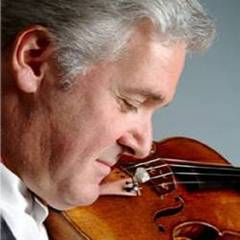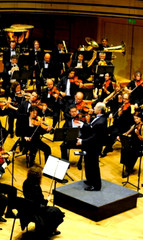|
Back
Magic Magyar Musicians New York
Avery Fisher Hall, Lincoln Center
01/21/2015 -
Wolfgang Amadeus Mozart: Overture to Die Zauberflöte, K. 620 – Violin Concerto No. 5 (“Turkish”), K. 219
Johannes Brahms: Symphony No. 1 in C Minor, Opus 68
Pinchas Zukerman (Violin)
Budapest Festival Orchestra, Iván Fischer (Music Director/Founder/Conductor)

P. Zukerman (© Paul LaBelle)
Where younger violin soloists sway and dance, edge close to the concertmaster, glance meaningfully at the conductor, and give a visual show, Pinchas Zukerman simply plays his fiddle. Last night, Mr. Zukerman walked on stage, and after the orchestral introduction he played that anomalous recitative as if he was warming up.
It isn’t easy to say that Pinchas Zukerman’s Mozart Fifth Concerto was boring. He still has the sweetest tone in the business, his fingers jumped over the keyboard, his legato was smooth as silk, those eccentric cadenzas were played without even a hint that anything could go wrong.
Yet, somehow, the old Zukerman fire was missing. Certain star performers–let’s say Emanuel Ax or Yefim Bronfman–are always edgy, always on fire, always with temperament–no matter how many times they perform mainstream works. Granted, it’s more difficult to find that fire in Mozart than in Brahms, but they manage.
Pinchas Zukerman, as always, was reliable, he blended in with the Budapest Festival Orchestra and their own fine string section. But this was hardly sizzling or even memorable music. For that, we had to listen to the first Mozart, and wait for the second half Brahms.

I. Fischer/B.F.O. (© Lincoln Center)
If some in the audience were coming only for Mr. Zukerman (several listeners left in the intermission), the evening always belonged to the Budapest Festival Orchestra and its founder-Musical Director-conductor Iván Fischer. Not because, unlike the soloist, he was all too ready to offer an exhaustive physical presence, but because, as he did two nights ago, he never allowed his music to “play itself”. What he has done with his Budapest orchestra was discussed in the last review. For a brief recapitulation, though, as a man who singlehandedly fought against lackadaisical attitudes during the Communist regime, he gave his players pride, discipline and ultimately an international reputation.
For his mainstream program last night, the secret was rarely idiosyncratic. Yes, he took the first theme of Mozart’s Magic Flute Overture with some strange accents, and he took the first movement of the Brahms C Minor Symphony with more than ordinary aggression. But for the most part, his Mozart and Brahms triumphed because his orchestra could be concentrated, almost intensely gorgeous.
For the Mozart Overture, those first chords were not merely stated. Each chord was played and the sound diminished until it was almost an echo which literally resonated all the way through to the main body of the music. After that, if the intonation wasn’t quite in the NY Phil’s category, it was always lively, it always pulsed forward with Mr. Fischer’s direction.
Nothing, I felt, could top Mr. Fischer’s direction of the Brahms Third Symphony on Monday evening, and true enough, the First Symphony has been performed in so many ways, that the Budapest Festival Orchestra offered no surprises.
But what need did we have for the unexpected? Mr. Fischer offered all the requisite gravity (literally helped by eight double-basses standing up in the back like an octet of Chinese temple gods!). It started with an imperial introduction, making way for a vigorous opening movement and a sudden subsiding into the coda. To some, the changes may have been too abrupt, but the Maestro obviously saw this as Brahms finally letting out all the stops after three decades of holding back.
The second movement had the benefit of beautiful violin solo by Violetta Eckhardt, and some faultless horn playing. There wasn’t that much grace in the grazioso third movement, but even the worst Hungarian orchestras I experienced always had terrific wind players, and Mr. Fischer let his wind consort waft, rather than blow, Brahms’s breezes.
And now to that all-too-famous finale. A fine horn opening, a grand, broad, brassy but intense movement which called for a gradual widening to that last coda. Other conductors have taken this coda at a very past pace, but Mr. Fischer hardly needed to suddenly bring up the tempo so abruptly. That’s what he did, though, and no apologies for his reading were needed
Whatever the blatant emotion of this Brahms, Iván Fischer lowered the Brahms temperature with another surprise encore. His orchestra now became a six-part chorale, singing one of Brahms’ a capella songs. Their musicality was smooth, delightful and as perfect as their instrument-playing.
On the other hand, as somebody who tried for a year to learn their language–in vain!–I figure, once you learn to speak Hungarian, making music this wonderful is child’s play.
Harry Rolnick
|